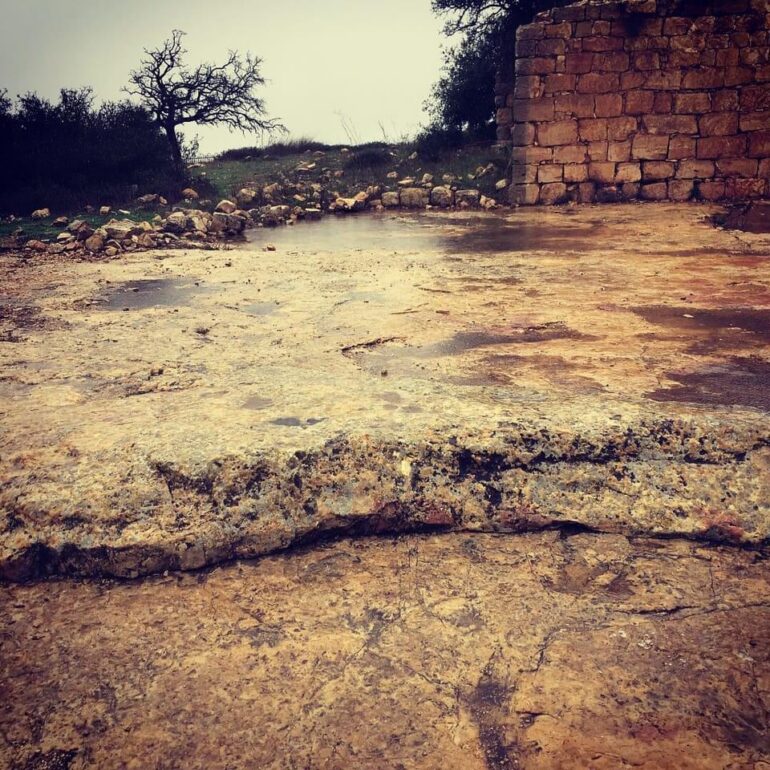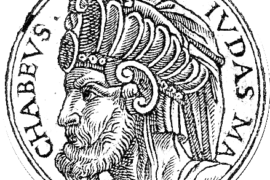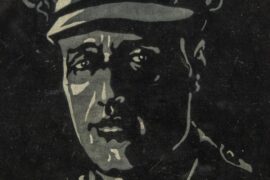For more content from VISION Magazine, subscribe to our newsletter and follow us on Twitter @VISION_Mag_, Facebook and YouTube. If you haven’t already, don’t forget to subscribe to our podcast on SoundCloud, iTunes, Stitcher, TuneIn, or Spotify and leave a rating and review to help us get our message out to a wider audience! To support the podcast, head over to our PayPal portal and be sure to write a note that your contribution is for the podcast.
Hosted by: Yehuda HaKohen
Transcript:
Parshat Vayetzei is largely the story of Yaakov attaining the characteristics of Esav in order to eventually become Yisrael.
The first time we see Yaakov mentioned in the Torah, he’s identified simply as Esav’s brother. At birth Yaakov held onto Esav by the heel – by the akev – and was therefore given the name Yaakov. Being associated with one of the lowest parts of the body might indicate that Yaakov seemed unimportant at first.
The name also connotes being curved or crooked – either physically or in the ethical sense. Yirmiyahu chapter 17, verse 9, uses the term “akov halev” to refer to a “deceitful heart.” And when Yaakov’s twin brother Esav later felt robbed of his birthright and special blessing from their father, he rhetorically asked in B’reishit 27, verse 36, if Yaakov’s name was connected to him twice outwitting him – vaya’kveni.
This indirectness, or curvature, can be a feature of Jewish behavior in the exile. It’s a survival mechanism often utilized by Jews who feel vulnerable in foreign lands and completely helpless in the face of physically stronger antagonists. But this can be corrected when Jews return home to our country and become Israelis. The word Yisrael actually includes within it the word yashar – straight or upright. By becoming more like Esav, Yaakov earned the name Israel and became a patriarch of the Hebrew nation.
Yaakov’s process of becoming more like his brother began at the age of 15 when he bought Esav’s birthright for some red lentil stew. This wasn’t a power grab but Yaakov actually stepping up for his family in a moment of crisis.
When their father Yitzḥak later intended to bless Esav with a special brakha, Rivka covered Yaakov’s hands with goat skin so he would feel like his brother and urged him to intercept the brakha for himself. It’s important to note that this blessing that Rivka wanted Yaakov to receive in place of Esav was not the Birkat Avraham concerning the national covenant with HaShem and the Land of Israel. That brakha was likely always intended for Yaakov, and Yitzḥak bestowed it on him in B’reishit 28, verses 3 and 4, with the full knowledge of who he was.
The brakha that had been intended for Esav was actually a blessing for worldly power and success. Yitzḥak had intended for his twin sons to form Israel together as a team, with Esav building the nation and Yaakov providing its spiritual content. But Rivka knew prophetically since her pregnancy that the twins would become progenitors of two mutually antagonistic civilizations and she saw that Yaakov also possessed the ability to build the nation deep inside himself, especially if he could obtain Yitzḥak’s brakha for earthly power.
Yitzḥak’s encounter with Yaakov wearing Esav’s hands initially confused him but ultimately convinced him that Rivka had been right, and that Yaakov was indeed capable of becoming Israel on his own.
This blessing for military and material success had actually not been intended for Yaakov or Esav but rather for a hybrid son with Yaakov’s voice but Esav’s hands. And that’s who received it – Yaakov with hands like Esav. In order for Yaakov to be able to become Yisrael, he would first need to gradually integrate some of Esav’s traits into his own character.
Yaakov the Jew had to become Yisrael the Israeli by learning to absorb some of Esav’s characteristics and use them in the service of the Hebrew mission. And that is the basic story we see playing out in Parshat Vayetzei – Yaakov went into exile and then returned home to become Israel.
Our parsha begins with Yaakov departing B’er Sheva to flee Esav’s wrath. But also to find a wife from his mother’s family in Ḥaran.
We already mentioned that Avraham’s brother Naḥor had been an ethnic Hebrew who made his home and raised his family in the bustling Aramean city of Ḥaran. Naḥor’s family attempted to influence the world’s leading cosmopolitan center with Hebrew teachings, but the fact that his son B’tuel and grandson Lavan are explicitly referred to in the Torah as Arameans reveals the extent to which the family had assimilated into Aramean society.
Rivka wanted Yaakov to take his wife from her assimilated family precisely because the cosmopolitan side of Hebrew identity is crucial for our mission. This feature shouldn’t become too dominant in Israel but it’s important that it be present in our national roots so we be pulled towards engagement with the outside world.
Rivka and Avraham had exemplified the s’fira of ḥesed and had to ultimately learn to refine this trait by balancing it with the attribute of g’vura. Yitzḥak and Sarah, on the other hand, had exemplified the s’fira of g’vura and had to learn to refine it by balancing it with ḥesed.
But Yaakov had exemplified the s’fira of tiferet, which was already a balance between ḥesed and g’vura. Tiferet can be translated into English as “glory” and harmoniously combines ḥesed and g’vura in a manner that expresses both attributes in their proper measure and appropriate times. Just as ḥesed is equated with mercy and g’vura with strict judgement, tiferet is associated with truth in the sense that both ḥesed and g’vura can find proper expression through it.
Within human beings, the s’fira of tiferet often manifests as compassion (raḥamim). And unlike the attributes of ḥesed and g’vura, which both needed to be purified through the personal advancements of Avraham and Yitzḥak respectively – a filtration process that produced Yishmael and Esav – all sons born to Yaakov were worthy and suitable for comprising the nation of Israel.
But Yaakov also had his own challenges to overcome. After receiving his father’s brakha, Yaakov still felt small. In a certain sense, we can see most of his life as a process of overcoming major self doubts and moving from the katnut – or smallness – of tiferet to the gadlut – the greatness – of tiferet – which is essentially the difference between being Yaakov and being Yisrael.
According to our Sages, Yaakov didn’t travel directly to Aram. He first spent 14 years learning Torah under the guidance of his ancestors Shem and Ever.
And he was also confronted by his nephew Eliphaz, who had been dispatched by Esav to kill Yaakov for stealing his brakha. Yaakov convinced Eliphaz to spare his life but take his wealth, arguing that taking a person’s possessions is tantamount to killing him. According to some opinions, he also asked Eliphaz if Esav’s family was prepared to be slaves in Egypt – a necessary prerequisite for becoming the Hebrew nation. According to this understanding taught to me by Fighter for the Freedom of Israel Elnakam, Eliphaz didn’t kill Yaakov but later told his son Amalek that once the Hebrews emerge from Egyptian slavery to freedom, the time will be right to finally destroy Israel.
As Yaakov departed for Aram, he stopped in the Canaanite city of Luz but didn’t sleep in the local inn for fear that Esav might find him. He instead climbed a nearby mountain – in fact the very mountain where I’m recording this right now – and assembled 12 stones underneath himself and went to sleep.
Yaakov dreamt a dream of a ladder connecting heaven and earth. And on this ladder there were malakhim – angels – ascending and descending.
There are many explanations regarding the meaning of Yaakov’s dream and all of them could be true. One is simply that the malakhim of Eretz Yisrael were ascending and being replaced by the malakhim of the Diaspora who would accompany Yaakov to Aram. Another interpretation is that the ladder symbolized the future State of Israel that would serve as a bridge – or a ladder – between the time of our exile and the time of our redemption.
But the explanation I want to focus on right now is that Yaakov saw the spiritual ministers, or guardian angels, of the four empires who would later in history try to prevent Israel from fulfilling our historic mission – Babylon, Persia, Greece and Edom.
A good way to understand one of these guardian angels is as the spiritual back end of its respective nation – similar to how we understand the code behind a website. Everything in our world has a corresponding back end – a spiritual minister.
According to this explanation, each one of these ministers climbed the number of rungs on the ladder corresponding to the number of years its empire would have dominion over Israel. The malakh of Babylon climbed 70 rungs, the malakh of Persia 52, the malakh of Greece 130 and the malakh of Edom – the empire that will descend from Esav and form Western civilization – kept climbing and climbing without any end in sight.
Following this vision, HaShem informed Yaakov in B’reishit 28, verses 13-15 that “I am HaShem, Elokei Avraham your father and Elokei Yitzḥak, the ground upon which you are lying, to you will I give it and to your descendants. Your offspring shall be as the dust of the earth, and you shall spread out powerfully westward, eastward, northward and southward; and all the families of the earth shall bless themselves by you and by your offspring. Behold, I am with you; I will guard you wherever you go, and I will return you to this soil; for I will not forsake you until I have done what I have spoken about you.”
HaShem’s promise here confirmed Yaakov’s status as Yitzḥak’s heir and helped begin the process of Yaakov overcoming his doubts.
When he woke up, Yaakov saw that the 12 stones he had placed underneath himself had become a single stone. He realized that he was on sacred ground and renamed Luz Beit El. The way Rashi understands this is that the spiritual back end of the Temple Mount in Jerusalem – what we can call Yerushalayim she mala – celestial Jerusalem – met our father Yaakov in Luz shel mata – terrestrial Luz. And that meeting caused Yaakov to rename the place Beit El.
When Yaakov arrived in Ḥaran, he met his beautiful cousin Raḥel with her father Lavan’s flock of sheep at the well. She led him back to her home, where he was welcomed as family. But he was also immediately put to work by Lavan until finally being asked a month later to negotiate his compensation.
Living with Lavan was important for Yaakov’s further development. Although ethnically Hebrew, Lavan had disparaged nationalist particularism in exchange for Aramean cosmopolitanism.
But the Aramean culture Lavan had assimilated into also normalized dishonest business practices. The word Aram is associated with arum and rama’ut, which translate into English as “cunning” and “deception” respectively. Time after time, Lavan tried to deceive and exploit Yaakov, forcing him to adopt cunning methods to protect himself. Although – or perhaps because – the attribute of tiferet is associated with truth, Yaakov often had to bend his truth without breaking it – learning to not be a sucker while still remaining honest.
Yaakov agreed to work seven years in exchange for Lavan giving him his daughter Raḥel as a wife. Raḥel had actually been destined for Yaakov but she had a slightly older twin sister, Leah, who had been meant to marry Esav. B’reishit 29, verse 17, contrasts Leah’s tender eyes with Raḥel’s beautiful appearance. Leah’s tender eyes represented a view of eternity that paid no attention to trivial things, while Raḥel’s beauty represented the transience often realized in the richness of a material existence.
Yaakov fell in love with Raḥel and worked hard for the promise of marrying her. But on their wedding night, Lavan switched Raḥel for Leah. Despite her love for Yaakov and the pain she felt due to her father’s scheme, Raḥel shared a prearranged secret with Leah so she wouldn’t be humiliated by Yaakov discovering the plot.
When Yaakov realized the truth the next morning and confronted Lavan, he discovered that along with Esav’s birthright came Leah as a wife. Yaakov agreed to work another seven years for Lavan in exchange for marrying Raḥel following the week of sheva brakhot.
Although the Torah does not prohibit taking more than one wife, marrying two sisters is very much forbidden. And even though the patriarchs had what we today call the Oral Law and naturally lived according to halakha without any legal obligation, halakha at that time had the status of “desirable but not binding.” And since this was all taking place outside of Eretz Yisrael, where the Torah becomes more real, Yaakov was able to marry both sisters.
Yaakov’s powerful feelings for Raḥel might have been based on his level of development at that moment. But it will be from Leah that the primary spiritual forces of the Hebrew nation will be born. And Leah’s final resting place will be alongside Yaakov in the cave of the patriarchs in Hebron, while Raḥel will be buried on the road leading to Bethlehem.
Thus, while Raḥel was very much Yaakov’s primary wife in the short term, Leah became Israel’s primary wife in the long term. But their rivalry over Yaakov’s affection and the children they bear him will very much characterize the early dynamics of their family.
It’s also important to note that Yaakov’s wives – and the dynamics between them – seem to have been in complete control of the family dynamics. Not only what each child would be named but also who Yaakov would have relations with on any given night.
Leah’s personal growth can be seen in what she named her children. The names Leah gave to her first three sons reflected her desire to attain Yaacov’s love and the hope that she could do so through bearing him children.
These names show of her gradual personal growth. The name of her firstborn, Reuven (from ra’a – to see), tells of her difficult marriage. She hoped that HaShem would see the pain that resulted from her being forced by her father to marry Yaakov through a deception, and that Yaakov would soften his attitude towards her.
Leah’s pain was, in a sense, a reflection of Yaakov’s own internal distress over having received his father’s brakha through a deception. But at this point in his development, it’s unlikely that Yaakov was able to see the parallelism of their destinies or appreciate that with the birthright and brakha also came Leah.
The name of Leah’s second son, Shimon, is formed not from “HaShem sees” but from shamo’a – “HaShem hears.” Yaakov’s attitude towards her didn’t sufficiently improve after Leah gave birth to Reuven. So the name she gave her second son shows that she was no longer blaming Lavan but blaming Yaakov for the problems in their relationship. Unlike seeing, hearing means to evaluate and to make a careful assessment. Leah continued to love Yaacov, but also began to gradually view him more critically.
The name of Leah’s third son, Levi, was formed from the root hilave – to accompany. She expressed hope that her husband would now cling to her. Having given up on influencing Yaakov’s feelings at a deeper level, Leah now hoped for him to become attached to her through their children.
And only when all that failed did Leah finally free herself of her issues with Yaakov and Raḥel, so she could focus instead on her personal dialogue with HaShem. The name of her fourth son, Yehuda, comes from the root l’hodot – to give thanks.
While Leah had until this point experienced jealousy towards Raḥel, Raḥel at this point began experiencing jealousy towards Leah. Raḥel even went so far as to very dramatically confront Yaakov and blame him for her infertility.
Yaakov responded harshly, telling her that it was HaShem and not him who decided she would be barren. But Yaakov was actually at fault for Raḥel’s inability to bear children because B’reishit 29, verse 31, tells us clearly that HaShem saw that Leah was unloved and opened her womb but Raḥel was barren.
HaShem saw Leah’s pain and therefore balanced the situation by allowing her and not Raḥel to produce children with Yaakov.
Yaakov should have understood that since Leah had become his wife, it was not merely an injustice imposed on him by Lavan but actually the Divine will, and he should have worked harder to make her feel loved. But because he refrained from doing so – at least at this early stage in their marriage – Leah gave birth repeatedly while Raḥel remained childless.
From this perspective, we can say that Yaakov could have been more helpful to Raḥel by working harder on his relationship with Leah. But Yaakov’s underlying sense of guilt, both for taking the brakha from Esav and for not being the husband he should have been to Leah, caused him to lash out at Raḥel.
But Raḥel had a plan. She gave her handmaid Bilha to Yaakov as a wife. Bilha, like Leah’s handmaid Zilpa, was apparently also Lavan’s daughter from a concubine.
Yaakov was now beginning to realize how heavy a burden he had taken upon himself when he acquired Esav’s birthright and blessing. Yaakov felt natural love for Raḥel. But properly loving Leah, who had originally been meant for Esav, would require Yaakov to integrate more of Esav’s qualities into himself.
Because Yaakov could not sufficiently love his two wives, he received a third, and then a fourth. He needed to learn how to properly apportion his feelings among them, which is precisely the path he needed to follow in order to acquire Esav’s qualities.
The problem wasn’t necessarily that Yaakov didn’t feel love for Leah. To a certain extent he did. He certainly accepted his marriage to her. When the Torah informs us that Leah was unloved, it likely means love as a verb and not a noun. The real problem was the disproportionate level of attention Yaakov paid to each of his wives.
What’s interesting to notice is how confident Raḥel was in Yaakov’s feelings for her. She wasn’t afraid that she would have issues with Bilha in the same way that Sarah had issues with Hagar. Within the context of the competition between Leah and Raḥel, both Bilha and Zilpa remained loyal to their mistresses.
When Bilha gave birth, it was Raḥel who named her children, showing the extent to which she considered these children her own. She calls Bilha’s first son Dan, from the word din – judgement, saying that the Creator had vindicated her. Dan, as a firstborn son who lays no claims to the right of a firstborn son, will actually perfect the concept of brotherhood and facilitate the later birth of Yosef.
Raḥel named Bilha’s second son Naftali, from naftulim – struggle, showing that she was still very much experiencing a rivalry with Leah. This rivalry had been a major source of Raḥel’s problems and something she needed to move past in order to be capable of giving birth herself. Raḥel’s major challenge at this point in her development was abandoning her rivalry with Leah and focusing on her relationships with Yaakov and HaShem.
But this rivalry clearly existed in both directions. Leah had been hoping that bear so many of Yaakov’s children would gradually make her more attractive to him. But now that Bilha had started giving birth on Raḥel’s behalf and Leah still felt she wasn’t receiving sufficient attention from Yaakov, Leah felt her advantage at risk and gave her handmaid Zilpa to Yaakov as a fourth wife.
But Leah’s motivations were different from Raḥel’s. Raḥel was motivated by the desperation of not being able to have children. Leah, on the other hand, already had four sons of her own. So when Zilpa gave birth, Leah saw these children as a necessary bonus to help her secure her place. She named the first son Zilpa gave birth to Gad, which means luck. And the second son Asher, which means happiness – like osher. From this, we can see that although Leah is also experiencing a competition with Raḥel, she’s less stuck in the rivalry and is able to experience joy at what she has. This testifies to Leah’s superior spiritual level, which of course helped Yaakov to further advance towards becoming Israel.
It should also be noted that because not only Bilha and Zilpa, but also their children, conducted themselves with such loyalty and dignity in their place within the family hierarchy, their descendants became fully included in Israel’s national framework. Bilha and Zilpa gradually became Jacob’s full-fledged wives, and their sons too were an essential component of the Hebrew nation. In fact, the tribe of Gad will later earn a reputation for producing Israel’s fiercest warriors. Although Yaakov’s sons through Leah will initially enjoy a higher status in the family hierarchy, the sons of Bilha and Zilpa will later become full fledged Hebrew tribes.
But Bilha’s sons didn’t satisfy Raḥel’s need to have her own children with Yaakov. When Reuven brought Leah a gift of duda’im, which were considered to increase fertility, Raḥel asked Leah to give them to her in exchange for Yaakov spending the night with Leah.
It’s important to understand that spending the night with Yaakov was not Leah’s condition but Raḥel’s offer. Raḥel’s tent might have been Yaakov’s primary home but he certainly was in the habit of spending some nights in Leah’s tent. This is obvious from the fact that Leah had already given birth to four of his sons but it’s also a Torah obligation for any man with more than one wife to regularly have relations with each of them. And the fact that Leah felt secure enough to give Yaakov Zilpa as an additional wife shows the degree to which she had begun to trust her connection with him.
But even one night with their husband was precious to Leah, and she agreed to trade Raḥel the duda’im for an extra night. And on that night, Leah conceived her fifth child, who she named Yissakhar, from the word skhar – reward. And then she had a sixth son, who she named Z’vulun, saying “yiz’v’leini ishi” – “my husband will exalt me.” These names demonstrate that Leah had by this time moved passed her rivalry with Raḥel and was far more focused on her relationships with Yaakov and HaShem. In fact, we see this even more clearly from what happened next.
Everyone in the family knew that Yaakov would have a maximum of twelve sons. Leah already had six and the two maidservants each had two. Yaakov at this point already had ten sons.
So when Leah became pregnant again, she feared that if her new child were to be another boy, Raḥel would at most be able to contribute only one son to the nation. According to our Sages, Leah was actually supposed to give birth to a boy. But because it was important to her that her sister Raḥel produce at least two of Yaakov’s sons, Leah successfully beseeched HaShem to change the sex of her child to a girl. And she named this girl Dina – from the word din – judgement.
Leah’s submitting to self-judgment and beseeching HaShem on her sister’s behalf made it possible for Raḥel to give birth to Yosef and Binyamin, and also provided Leah herself with an opportunity to attain another level of spiritual growth.
Leah’s growth in general came through her gradually coming to acknowledge and accept the fact that Raḥel was Yaakov’s foundational wife. This wasn’t easy for Leah. She was technically married to him first and even accused Raḥel in B’reishit 30, verse 15, of stealing him from her.
But Leah did gradually come to recognize Raḥel’s role – a role was actually temporary because although Raḥel was Yaakov’s primary wife, Leah would be Israel’s primary wife – and therefore be buried together with him in Hebron.
Women occupied strong leadership roles in the Hebrew family that might have been unusual at that time. While the men might have been the public face of the family, the women essentially ran the show internally. We could say that the men served as foreign ministers to the outside world and the women served as interior ministers within the Hebrew collective.
Both Sarah and Rivka made major decisions regarding the family’s development. And Yaakov’s wives decided what names to give the children, who he should spend the night with and when their family should return back to his native land.
In any case, almost immediately after Leah gave birth to Dina, Raḥel gave birth to Yosef. B’reishit 30, verse 22 tells us that the Creator heard Raḥel, implying that she had reached out to Him. This is actually the first time the Torah mentions any attempt by Raḥel to communicate with HaShem. Until this point, she had attempted to overcome her infertility through other means, like seeking Yaakov’s miraculous intervention, having children through her maidservant Bilha or the duda’im. But once Raḥel opened a personal dialogue with HaShem, she was able to conceive and give birth to a son. She named this son Yosef, saying “Yosef HaShem li ben aḥer” – “May HaShem add for me another son.”
The birth of Yosef had a major impact on balancing relations within Yaakov’s family. So long as Raḥel had no children, she couldn’t take her rightful place among Yaakov’s wives. But now that balance was finally being achieved, Raḥel no longer felt herself in competition with Leah. This shift in Raḥel’s attitude allowed for a much healthier family dynamic that prepared the Hebrew family to return back to Yaakov’s country.
There’s also another reason why Yosef’s birth signaled to Yaakov that it was time to return home. Rashi comments on B’reishit 30, verse 25, that the birth of Yosef filled Yaakov with confidence that he could now successfully confront Esav. Rashi quotes Ovadia chapter 1, verse 18, that refers to Yaakov as fire, Esav as straw and Yosef as the flame.
Yosef was the power within Yaakov that Rivka had seen – the power to be like Esav and to ultimately defeat Esav. Yosef is the part of Israel that can build nations and armies and economies. Yosef is the force within the Hebrew identity that can succeed in the material world. In fact, throughout Jewish history, Yosef has represented the sector of the nation that primarily concerned with Israel’s material wellbeing.
The Gaon of Vilna teaches that the movement of Mashiaḥ ben Yosef will be the material rebuilding of the nation of Israel. And Rav Avraham Yitzḥak HaKohen Kook elaborates that Zionism – Tzionut – was in fact this movement.
It’s important to note that according to the g’matria, the numerical value of the words Tzion and Yosef both equal 156. The Zionist movement, the movement of Yosef, must take the lead in building the State of Israel – in building the body of the reborn Hebrew nation.
But Yosef is also the part of our identity that most resembles and desires a relationship with whatever civilization is most dominant on the world stage. In the time of Yosef ben Yaakov, that civilization was Egypt. Yosef looked like an Egyptian, to the point that his brothers had trouble recognizing him. This force within Israel has manifested differently throughout history but today it’s expressed through the Jews most connected to Western civilization – the civilization of Esav. So the irony is that while the force of Yosef is important because it can build a nation, succeed materially and ultimately defeat the fourth empire, it also possesses within itself a dangerous urge to assimilate into the civilization it must defeat.
So although the force of Yosef was necessary for building the State of Israel and must remain as an important component of our identity, tribal forces like Yehuda must ultimately take the lead and fill our state with the deep spiritual content that will direct the reborn nation to achieving our historic purpose.





